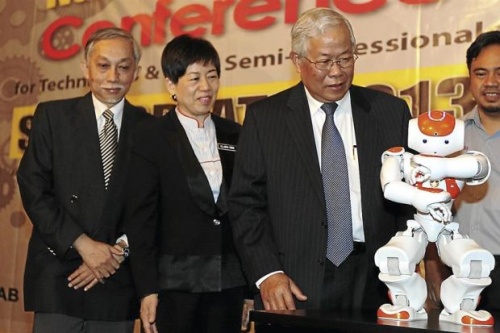Tuesday October 8, 2013
 Pretty hi-tech: (From left) Abang Abdullah, Politeknik Kuching director Clara Ong and Manyin watching a dancing robot at the opening of the conference in Kuching. — ZULAZHAR SHEBLEE / The Star
Pretty hi-tech: (From left) Abang Abdullah, Politeknik Kuching director Clara Ong and Manyin watching a dancing robot at the opening of the conference in Kuching. — ZULAZHAR SHEBLEE / The Star
KUCHING: Malaysia needs to produce more technicians and semi-professionals with technical, vocational education and training (TVET) to feed the growing global market workforce.
Chief Minister Tan Sri Abdul Taib Mahmud said the country realised this, hence technical education and vocational training had been set as a priority agenda.
“TVET education is crucial as a means of preparing our students for effective participation in the world of work. The curriculum prepares them for a career that requires specific skill-set,” he said at the opening of inaugural National Conference for Technicians and TVET Semi-Professionals SwakCREATE here yesterday.
In a speech read by Infrastructure Development and Communcations Minister Datuk Seri Michael Manyin, Taib said various measures had been planned and carried out by the Government to encourage the corporate sector’s involvement in the development of highly skilled manpower.
“Some RM3.7bil has been allocated in the 2013 Budget to train students in the technical and vocational fields,” he said, adding that by 2020, it was expected that 46% out of 3.3mil jobs created under the National Key Economic Area (NKEA) would require graduates with vocational certificates or diplomas.
“It is predicted that the demands for vocational skills would continue to rise, hence, the need for the key players in the education field to provide quality TVET education for our young people.”
Taib said employers, particularly those in the corporate sector, ought to observe the specific work-related needs of TVET graduates to help them realise their full potential and continue to improve the quality of TVET education.
Employers and higher learning institutions also need to work together in ensuring that the job market had adequate supply of high-skilled worker, he said.
As the country’s leading TVET education provider, he said, polytechnics in Malaysia must ensure the graduates’ employability, career development, upgrading in the education system, public acceptance and image.
As far as the state was concerned, Taib said Sarawak Corridor of Renewable Energy (SCORE) would offer vast career opportunities in technical and non-technical fields in the coming years. He hoped that more school leavers would choose studying at polytechnics as their first choice to meet the domestic and global demands for quality manpower.
Earlier, Malaysian Society for Engineering and Technology (MySET) president Prof Datuk Abang Abdullah Abang Ali said for many years now, technicians had been in a “dead man’s shoes” as no one bothered to look into their professional and career path development.
Although in some parts of the world like the United Kingdom a lot of emphasis was made to make the profession more important than before, Malaysia was still slow in doing the same.
Politeknik Kuching and MySet jointly held the two-day conference to provide a platform for discussion on professionalism amongst technicians, including the sharing of information and experiences in innovation.